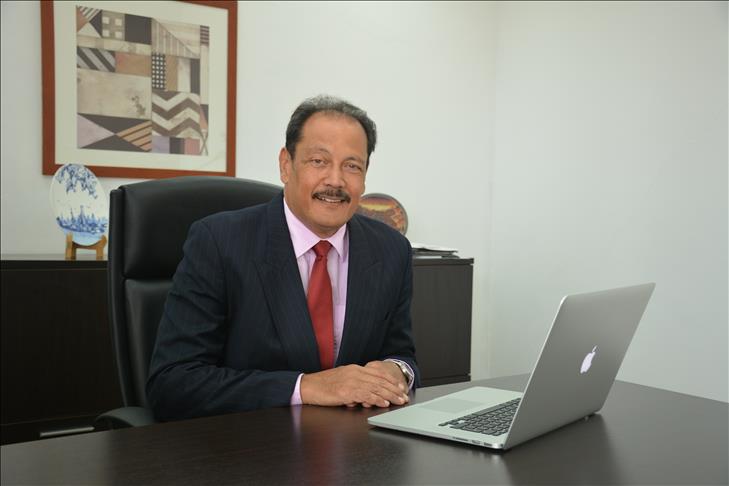
by Anderw Rosenbaum
ANKARA
May 25 is Africa Day, which marks the founding of the African Union’s predecessor body in 1963.
South Africa’s current president, Jacob Zuma, recently told an audience at the University of Pretoria that growth on the continent must be “inclusive”.
Indeed, the Organisation of African Unity (OAU) has always claimed that economic development was crucial to the development of African’s myriad economies.
Mauritius – a tiny island nation in the Indian Ocean – joined the OAU in August 1968. After years of relying on tourism, the country now ranks first on the World Bank’s Ease of Doing Business index.
Gerard Sanspeur, chairman of the Board of Investment Mauritius, tells Anadolu Agency that opening its economy is one reason why the country has risen in prominence.
Mauritius was almost entirely dependent on tourism five years ago, Sanspeur says – although it still attracts about 1 million visitors every year.
Today, the country exports food and jewelry. It also has a robust manufacturing industry and is an international banking center.
Successful attraction of FDI
Mauritius is now trying to attract more investment from overseas across a wide range of sectors, aside from its traditional tourism breadbasket.
Sanspeur says a special Financial Sector Incentive Scheme will be introduced to attract international asset and fund managers to relocate their front-office operations in Mauritius.
In 2002 the London-based Standard Chartered Bank launched operations in Mauritius in with only 19 employees; it now employs 100 people on the island.
The government is also working to promote Mauritius as a knowledge hub; in this regard, a new legal framework will be put in place for the development of quality education and research, Sanspeur said.
"Further to consolidating existing economic sectors, the development of new economic pillars such as the regional bunkering hub, the ocean economy, the duty-free shopping paradise initiative have been identified as recipients for new FDI inflows," he continued.
The government also has ambitions to position the Stock Exchange of Mauritius as a capital-raising platform for international and African-focused financial products.
In terms of infrastructure, the government is supporting 13 mega projects across the country. These will be developed over 7,000 acres of land and will call for MUR120 billion (US$4 billion) of private and foreign direct investment, Sanspeur said.
Some of the initiatives include the transformation of the capital, Port Louis’, harbor from a destination port to a regional hub. A new Petroleum Bill is to be introduced to provide the legal and fiscal framework for the exploration and exploitation of hydro-carbon resources in the Mauritian Exclusive Economic Zone also.
The island also has plans to modernize its fishing industry to incorporate international norms and practices, and the information and communication technologies sector is being developed to attract high-end, value-added services.
But the government seeks to attract more FDI with specific initiatives, Sanspeur said.
"Inflows in the real estate sector constitute the lion’s share of FDI in the last few years. To remedy this imbalance, the government is taking a number of specific measures, including enhancing proximity with the target markets, affirming its presence in strategic cities in China, Switzerland, South Africa, England, Russia, India, the U.S. and France."
Plans include better management in the allocation of state land with a Digital State Land Register and an “appropriate” wage policy, Sanspeur said.
Mauritius’ improved performance stems from reforms to its business environment, including the streamlining of the registration process for the incorporation of companies to three days, the review of processes for access to credit as well as the credit registry system.
Legal reforms have also seen changes to the commercial division of the Supreme Court plus increased digitization of paperwork for customs purposes.
A hub for investment in Africa
Sanspeur believes that Mauritius is positioned as a business and investment gateway to access the emerging economic power which is Africa.
"Risks faced by investors in African countries are higher than in other regions of the world." Sanspeur noted, "and this is where Mauritius has cut its strategic role in risk mitigation, since it is a politically stable, well-regulated and business-friendly international business platform.
“The country is an internationally recognized safe and trusted international financial center governed by the principle of the rule of law and a large and growing network of Double Taxation Avoidance Agreements and bilateral investment agreements."
Investment into Africa represented more than 54.2 percent of the Mauritian outward investment portfolio for the period of 2008 - 2014.
In fact, Mauritius has a proven track record, with over 80 Mauritian companies having invested in Africa in the financial services, agribusiness, real estate, ICT, manufacturing, logistics and energy sectors, Sanspeur said.
As the African Union celebrates its anniversary, eyes could be turning to one of its smallest members.
Anadolu Agency website contains only a portion of the news stories offered to subscribers in the AA News Broadcasting System (HAS), and in summarized form. Please contact us for subscription options.

